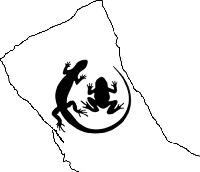About us
About Us
Aim
The aim of this group is to understand and protect the amphibians and reptiles of the Wirral peninsular through organizing training, raising awareness, surveys, habitat management tasks and other conservation activities.
Background
The Wirral Peninsular has historically been habitat of Sand Lizard, Natterjack, Great Crested Newt, Common Frog, Common Toad, Smooth Newt, Palmate Newt, Common Lizard, Slow Worm and Grass Snake. However, developments in the 20th Century has seen species such as the Sand Lizard and Natterjack disappear. Status of other herps have been uncertain, the problem being linked to lack of surveys and recording.
In 2018, preliminary surveys around Wallasey revealed many new and surprising records for amphibians and reptiles. This was part of the Cheshire & Wirral ARG. However, the size of this district with that county was too large, necessitating the formation of a new ARG for Wirral (WiARG) so more surveys and recording can be coordinated across this interesting peninsular.
Founding member and current Chair of WiARG, Tom Doherty-Bone, grew up on the Wirral and was frustrated by the lost herpetofauna species and limited opportunities to view the remaining herps in the area. Formation of this new ARG will create the opportunity for local residents in the Wirral to get involved with amphibian and reptile surveys and recording for both enjoyment of these wonderful animals and to aid in their conservation on the Wirral.
Activities
Since its formation in 2019, WiARG has undertaken numerous surveys and practical conservation tasks across the Wirral. Some of the highlights have been mapping out the extent of Common Lizard in Harrison Park, Wallasey, as well as lizards and amphibians across the North Wirral Coastal Park. Updating the known status of amphibians (including Great Crested Newt) at Royden Park and more recently measuring the use of the tidal zone of amphibians in the north west Wirral coast.
An outline itinerary for 2023-24 can be found under the 'Upcoming surveys' tab, suggestions from members are welcomed.
Existing partnerships include the Wirral Ranger Service, Cheshire Wildlife Trust, the Friends of the North Wirral Coastal Park and Wirral Wildlife.
Committee
The present committee consists of: Thomas Doherty-Bone (chair); Sue Noyce (secretary); Jon Bielby (vice chair); Frankie Bielby (treasurer); Charles Mulryan (general committee); Mike Brown (senior adviser).
Membership
The membership fee for 2023-24 is £5 (£2.50 for under 17s when accompanied by a guardian), which goes toward conservation activities of the group, such as buying equipment. Payment can either be made in cash, bank transfer or through Paypal: https://paypal.me/WiARG?locale.x=en_GB
Membership cycle runs from April to April.
Please get in contact if you wish to get involved.
News
News
Dr Tom Doherty-Bone's talk on the setting up of WiARG July 21
Climate breakdown versus the amphibians & reptiles of the Wirral
As the discussion of climate change and resulting climate breakdown is at the forefront of news at the moment, we highlight how these issues touch the Wirral’s amphibians and reptiles (collectively referred to as “herps”), often in unexpected and counterintuitive ways. Many of us living in the Wirral already notice how our winters have been less snowy the past decade compared to previous. But how is this affecting our herpetofauna on the Wirral, who are sensitive to changes in temperature and have to hibernate through the winter? Some of us have been surprised by seeing frogs moving about on Christmas Day. Do these mid-winter emergences result in their death when wandering around in a daze with nothing to eat and does resumption of cold kill them off? How about changes to rainfall? Or rising temperature?
At the Wirral Amphibian & Reptile Group (WiARG) we are doing our bit to see how our local herps are faring in response to a changing climate. Our basic effort is to monitor and take action to build resilience where we can. Some volunteers are monitoring various sites for the initiation of breeding by various amphibians, especially by WiARG secretary Sue Noyce of Common Frogs at Central Park in Wallasey. We have also been checking for earliest emergences for Spring and latest occurrence for autumn in Common Lizard at Harrison Park Wallasey. This year, we still found lizards active mid-October. And there has been our study on how amphibians use coastal habitat down to the strandline at Hoylake-West Kirby, which has implications for inferring changes to sea-level.
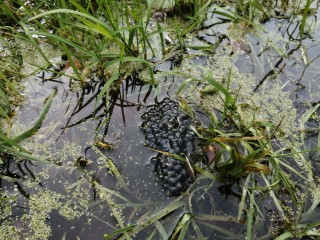
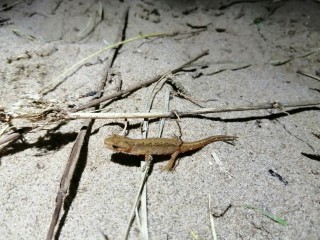
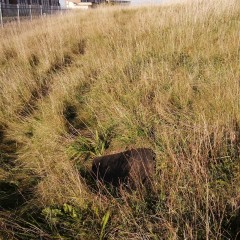
Sometimes it may be necessary to highlight the need to divert seemingly positive climate action where it will do more harm than good, such as planting of trees in habitat that will actually cause declines of herps. Tree planting to restore lost woodland and reconnect others is great, but planting in habitats like established grasslands, sand dunes, peatland and heathland does shade out the sunny spots herps and other organisms need to live - thankfully the Wirral Tree Strategy does take this into account. As one example, in one park where we found an important Common Lizard population, the rangers diverted tree planting efforts to another site so they would not loose their grassland habitat.
The most salient example of how climate change (more realistic rephrase: climate breakdown) is impacting amphibians on the Wirral is at Royden Park near Frankby. We found the Great Crested Newt still occur here, but the single pond we found them breeding was found to dry out before larvae could metamorphose in both years surveyed. We are hoping for a 2022 Spring and Summer that is wet enough and mild enough for the water to stay long enough for the babies to grow, but it doesn’t look good. At the start of this project in 2019 it was already clear that the network of ponds in Royden were far from adequate to support a resilient population. It is likely the loss in the past century of big animals such as deer, beavers, livestock that would have kept the ponds open and resilient has caused them to shrink in size and suitability for pond life. WiARG has been working with the Wirral Council rangers to manage these ponds, trimming branches and small trees from the edge of the ponds and removing debris to reduce anaerobic digestion which reduces oxygen levels. Doing this actually helps stop these ponds releasing greenhouse gases and helps them sequester more carbon. After the initial works by volunteers from WiARG with those at Royden Park, it was realised a more dedicated, drastic action was needed, especially as volunteer time in the winter of 2020-21 was lost to covid-19 lockdowns. So the Volunteer Rangers of Royden Park led a grant bid with WiARG to get contractors to drastically thin out trees and line one pond adjacent to another where crested newts had been seen but not yet breeding. The grant bid with the Burbo Bank Community Fund was successful and we are waiting for works to commence. This should produce a pond that is more resistant to drying out during droughts.
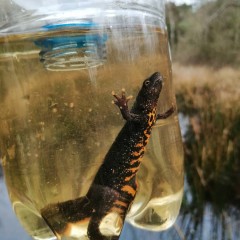
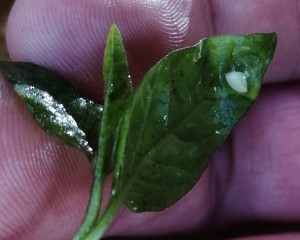
With the negotiations at COP26 in Glasgow in progress, changes to the climate are with us already and we need to be vigilant to how these changes will impact our wildlife. As efforts continue to reduce emissions and capture carbon, WiARG will be proactively working to understand how these changes are affecting our newts, frogs, toads, lizards (and snakes if any show up) and do what we can to mitigate the negative impacts for a resilient and healthy community across the Wirral.
Have we got newts for you! Spring/early Summer Update
From mid March the COVID-19 Pandemic put everyone in a spin, with our AGM cancelled and a brief spate of limbo as the lockdown followed. The permitted 1 hour exercise in the outdoors enabled us and other ARG Groups to take the opportunity to survey herps, at least alone. In the case of the Wirral ARG, we were able to continue our plans to survey the ponds of Royden Park to work out if Great Crested Newt still occurred there and whether the ponds managed over winter were being used.
The last official records in Royden Park went back to the 1980s, with only one other record in 2011 and one unverified (these newts can be mistaken with Smooth Newt) sighting from 2017. Was the management of the park conducive to the persistence of this highly protected species, historically imperilled by land use change? Before we surveyed, we could tell there were lots of ponds but nearly all not quite suitable for this species to breed in. Hence a succession of management interventions were planned and carried out by WiARG volunteers, the park rangers, Friends of Royden Park, and the Wirral Evolutions group. These were carried out through the winter months where we would have least disturbance on any newts. Trees were thinned out around ponds, invasive weeds were removed, measures that would increase the "Habitat Suitability Index", the technical measure of whether a pond will support a breeding population of cresties.
So to the surveys, covered by a licence from Natural England, torchlight searches, bottle traps and egg searches took place. We shouldn't disclose exactly where we found them, but the Great Crested Newt was alive and well in two ponds. One pond had adults, subadults, larvae and eggs. There were also plenty of Smooth Newts and Common Frog tadpoles. One of the ponds which was managed had a female crested newt checking it out and plenty of Smooth Newt, but not enough aquatic plants to lay eggs on. The other ponds had no newts at all, and only some frog tadpoles. Some of the ponds in Thurstaston Common were checked, but these seem to be massively disturbed by trampling, especially from dogs. What became clear as the May drought proceeded was how these ponds are very susceptible to drying out, and possibly threatens the ability of the next generation of newts to survive. Ways to mitigate this will be investigated for the coming winter tasks.

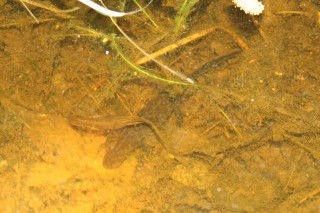
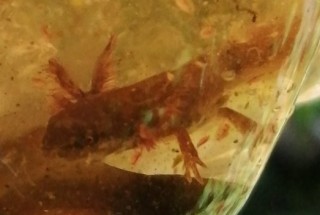
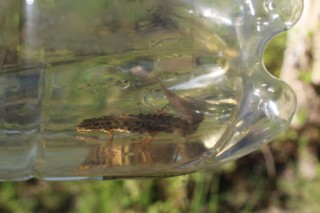
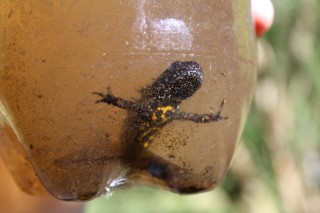
In addition to Royden Park, ponds at Jenny's Wood, Saughall Massie were surveyed. These ponds was found to be used by Smooth Newts, though one was full of fish, leaving only one suitable to breeding newts. This one pond was still in a bad state, full of garbage and in need of some clearing of vegetation so the water column is more open. This is a clear candidate for management, and possibly attracting use by crested newts too as the NBN Atlas has shown records for them to the north of the site as recently as 2017. On to Eastham Country Park, where discussions have taken place with the ranger there for possible surveys and tasks. Numerous ponds were shown that were not known to the chair (shamefully considering he did a Geography Key Stage 3 report on this park!), and lots of potential for improving ponds for amphibians and surveying the effectiveness was agreed. Other sites have been visited, such as Central Park Wallasey, and Harrison Park where we have been monitoring incidents of fire.
The next stage now, going into the end of summer, is to assess terrestrial habitat use by newts and other amphibians in these and other parks. This is to help understand where the newts, frogs and toads go to forage when they are not breeding in the ponds. This provides an evidence base to the park managers to protect natural habitat, especially from invasive species such as rhododendron shrubs and from interests to create ornamental gardens that push nature out. Great Crested Newt that are being encountered are being individually recorded so an accurate population assessment can be made. In addition, a survey campaign is planned for the entire North Wirral Coastal Park for reptiles to help inform effectiveness of habitat management by the rangers and friends group.
This work is dependent on funds to acquire equipment to achieve this, so do become a paid member (£5 a year) or if you want to make a donation, you can make one here: https://paypal.me/WiARG?locale.x=en_GB.
AGM Cancelled
Due to the ongoing COVID-19 crisis, the AGM planned for the 27th March is cancelled to reduce the risk of spreading this pathogen further. It will be rescheduled once it is certain this matter has passed. Apologies for any inconvenience.
Change of date for Red Rock Task
At request of the Cheshire Wildlife Trust, we will be rescheduling the task day at Red Rocks Nature Reserve from the 2nd to the 23rd February. Apologies for the incovenience.
Committee Members
Committee Members
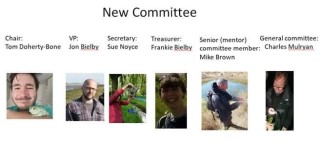
Upcoming Surveys
Upcoming Surveys
There are multiple surveys planned for Friday 24th May at Central Park, Birkenhead Park and Prenton Dell.
Each survey will consist of setting traps and torching ponds on Friday, then returning early on Saturday morning in order to empty the traps and record what's there. As with all surveys, appropriate clothing, water-proof shoes/boots and torches will be useful.
Please use the "check-clean-dry" technique with your outdoor gear for biosecurity. Likewise, if you keep amphibians and reptiles at home, probably use separate clothes if you have been handling or servicing them to save spreading exotic pathogens around.
Let us know if you are planning to attend.
Photo gallery
Photo Gallery
Upcoming Events
Upcoming events will be listed here.
Latest News
- 2024 activities in more detail
27/03/2025 12:35 pm - 2024 - A summary of a busy year
27/03/2025 12:19 pm - Notice of Annual General Meeting and Survey Training Session Sat 25th November Royden Park
28/10/2023 10:46 am - Grass Snake Reports in Ellesmere Port
04/05/2023 3:25 pm - WiARG AGM 12/12/22
06/03/2023 9:57 pm
© Wirral ARG (WiARG)
Website hits: 24102
View All | Find out how to get a mini-website for your ARG
© ARG UK Local Groups mini-websites 2026
Wind powered websites by Aye-aye Design.
